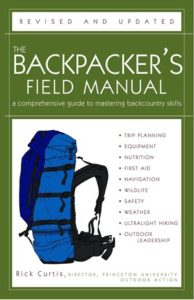A student fractures a leg, dislocates a shoulder or lapses into a coma. Weather and terrain prevent radio communication. You are five hours from the trailhead and a telephone. Medical analysis and care are needed. Now, what do you do? How will your conduct be judged?
The medical care you and your staff provide in wilderness settings should be “reasonable and prudent.” The responsible wilderness care provider will concentrate on the opportunities to be of service and not let a concern for liability control his or her performance. The law requires only what rational patients should require and protects those care providers who do their jobs well.
You could find yourself, however, defending a lawsuit which claims that you should have done more, or less, for a patient. Failure to defend such a claim successfully can hurt you and your program professionally and financially. You should, therefore, understand the legal issues involved in this new and important field of medicine.
This short article deals with general legal concepts, not the laws of particular states. You should seek legal advice regarding the applicable laws of your state and consult with your medical advisor, if you have one, regarding the medical aspects of the discussion which follows. A medical advisor is a licensed physician who advises an unlicensed medical practitioner.
The areas of the law which are most important to the outdoor industry professional, whether in the city or the wilderness, are contract and tort law. These are branches of civil law, as opposed to criminal law.
CONTRACT LAW
Contracts are promises which are expressed or implied, written or oral. A person can be sued to enforce these promises or to pay money if they are broken. All parts of a contract should be clearly expressed and understood: Who is to do what, for whom, when, and for what consideration or payment, and the remedy if a person does not perform as promised. At some time in your career, if you haven’t already, you will have a contract with someone, perhaps your employer and/or a client. Some states might consider that you have entered into an implied oral contract as soon as you or someone on your behalf causes another to believe you will give medical assistance if needed. Other contracts with which you may be involved are “releases” or “waivers,” whereby a person forgives you in advance for a wrong you might later commit, and contracts of insurance which allow you to acquire protection from claims of persons who may be injured by you.
TORT LAW
The other area of the law, and the one in which you will probably be involved if you are ever named in a suit, is tort law, which deals with wrongs to people and property not usually involv- ing contracts. The word tort comes from French word meaning “wrong” or “harm.” While the most familiar of these torts are intentional bodily injuries and fraud, the focus of our discussion will be the tort of “negligence,” that is, the careless, unintentional act which harms another per- son to whom you owe a duty of care.
NEGLIGENCE
The good news is that, generally, you will be protected from legal liability for negligence if you do your job well and in accordance with the standards of the wilderness medical care professional. These may not be the standards of “street” or urban medical care providers. Typically, and in your favor, persons wsho participate in outdoor ventures are more likely than others to accept responsibility for a risky activity, and therefore, are less likely to sue. Nevertheless, this area of the law is of considerable interest to the wilderness care provider, whose scope of responsibility and authority may vary from state to state and whose role in a particular situation may not always be well defined by law. The elements of a claim of negligence are 1) a duty of care, 2) a failure to perform that duty, and 3) a loss or injury that was 4) contributed to by the failure.
DUTY OF CARE
In most states you have a duty to a person if you have a prior relationship with him or her. If the person is in your direct care, or is a participant in an activity (a summer camp or outdoor program activity, for example) for which you have been hired to provide medical care services as all or part of your job, you clearly have a duty to that person. If you know a person is relying on you for assistance, you may have a duty to that person. You have a special relationship with that person, who is no longer a “stranger.”
THE GOOD SAMARITAN RULE
To encourage trained people to offer care, most states have laws called “Good Samaritan” laws which provide that a person who voluntarily gives emergency assistance wiill not be liable for “simple” carelessness. i.e., negligence. There is no such protection for “gross” negligence, which is carelessness that is so extreme that it reasonably appears you had complete disregard for the person injured. Note that Good Samaritan care must be voluntary and performed in an emergency. In a wilderness setting, such a statute might control your voluntary care of a stranger found injured on the trail, but if you have a duty to act, the Good Sam laws do not protect you.
CONSENT
Before care is given, the informed consent of an adult, or the parent or guardian of a minor, is required by law and should be in writing or at least witnessed by a third party whenever possible. Informed consent means the patient is advised of the problem, the proposed treatment, the risks of treatment, and what to expect if no treatment is given; and the patient gives consent, actual or implied. Failure to acquire informed consent could possibly result in a suit against you for assault and/or battery.
Fortunately, the law recognizes implied consent in emergency situations when it can be reasonably assumed that the patient, if conscious and reliable (or a parent, if the patient is a minor), would have agreed to the assistance offered. If you work with minors, which means, in most cases, anyone under 18 years of age, you are well advised to carry a document signed by the parent or guardian allowing you to provide medical care in an emergency.
STANDARD OF CARE
The standard of care in pre-hospital medicine is determined in part by the training you have been given, that has provided you with the skills and knowledge of how to do what, and when. If your patient assessment, for instance, reveals the possibility of a fractured leg, the standard of care, generally, is to appropriately splint the leg in question and monitor the patient.
Because wilderness medicine is a new profession, the standards may be less clear than for those operating in ambulances, emergency rooms, and other city situations. What you are allowed to do will depend on the laws of the state where you work and/or the medical protocols written for you by your medical advisor, if you have one. Be sure you are operating within those laws and protocols as you consider reducing a dislocation, for example. How well you perform will be measured by standards which are much broader. Never do more, or less, than you are trained to do.
FAILURE TO PERFORM THE DUTY
The second element of negligence is a violation, or breach, of the duty of care. A breach can be an act (commission) or, equally significant and common, a failure to act (omission). Generally speaking, the law will consider you at fault and liable for payment of damages to the injured person if you have not performed as would a reasonable person with your background and training, acting in the same or similar circumstances. Examples might be the misreading of obvious vital signs or the failure to splint a fracture. Gross negligence might be attempting to provide care when you are under the influence of drugs or alcohol.
LOSS OR INJURY CAUSED BY THE FAILURE
The third and fourth elements of a negligence claim are a loss or injury, of which the breach of duty or wrongful act is a contributing cause. The “loss” can include fright and other emotional trauma and certainly includes loss of property, personal injury, and death. You will not be liable if another person or event is shown to have caused the injury–for example, a qualified person to whom you transfer the patient acts negligently. Also, the loss must have been a reasonably foreseeable result of the breach of duty. You should not be liable if a person, because of some pre-existing condition of which you could not have been aware, reacts badly to a regular procedure applied by you. In this event, a person with your training could not have foreseen the result and should not be liable.
DEFENSES
If you are sued for negligence, you have other defenses. These defenses include the absence of one or more of the four necessary elements: duty, failure to perform the duty, loss or injury. and causation. The negligence of others, including the person injured, can also reduce or eliminate your liability. In many states, the judge or jury is allowed to compare, on a percentage basis, the fault of all who may have contributed to the injury. This is usually referred to as “comparative negligence”or “comparative fault” and assures that you are obligated only for that part of the loss that a judge or jury determines is caused by you.
DOCUMENTATION
You may have heard the saying, “If it isn’t written down. it didn’t happen.” In a lawsuit, this means that if an important event is not recorded by the care provider, the judge and jury will probably assume that it did not occur. It is important, therefore, in order to avoid speculation about what happened in the field, that you make a written record at the time of the event or shortly thereafter. The record should include at least dates and times, patient history, a description of the scene, your physical assessment and treatment, and changes in the patient while in your care. It is also important to document, with a witness if possible, a refusal of treatment by an informed patient.
THE LAW AND THE WILDERNESS CARE PROVIDER
What is the practical legal effect of all this? The care provider, as we know, assesses the emergency; removes the patient from harm; stabilizes the patient; provides other limited, essential care; and prepares proper reports and records. As a wilderness care provider, you will probably have more responsibilities (for expedition medicines, for example) and will provide treatments that might not be indicated if hospital care were more available.
Most of the issues facing the care provider on wilderness expeditions will relate to athletic injuries, environmental emergencies, and hygiene-related problems, but there is always the possibility of severe trauma or illness, a difficult-to-diagnose stomach cramp, a diabetic reaction,or a severe laceration. Such occurrences, an hour or longer from the attention of a licensed physician, are much more serious than if encountered in Your Home Town, USA. In a wilderness or outdoor program setting, additional issues important to you as a staff person will include 1) the screening and supervision of participants, 2) the adequacy of equipment and supplies, and 3) the presence of a carefully designed plan for medication administration, evacuation, and other emergencies. If you accept the responsibility of care in the wilderness, you must be prepared with appropriate training, equipment, and medical protocols.
THE BOTTOM LINE
You are well advised, then, if you work for an outdoor program or search-and-rescue team, to seek out and work under the authority of a medical advisor. The medical advisor or base-station physician will share responsibility with you for the adequacy (or inadequacy) of your performance if he or she authorizes you to administer drugs or reduce dislocations, close wounds, or otherwise engage in procedures that might exceed the customary role of the city first responder. If it is done well, there will be no complaint. If done improperly, questions of training, technique, authority, consent, and alternative remedies will be carefully examined by investigators, lawyers, experts, and a judge and jury.
To best serve your patient, stay well informed and well trained up to the standards of your level of certification, and perform accordingly. The law is designed to protect such persons and, while there are no guarantees, proceeding in this manner will minimize the chance of lawsuits and improve your chances for success if a suit is filed.
For more information see Reb’s Web site – www.rebgregg.com
All rights reserved. Outdoor Ed LLC is granted full permission to display the article and all associated material. This material may not be reproduced or extracted in any fashion electronic or otherwise without the express permission of the original author.


